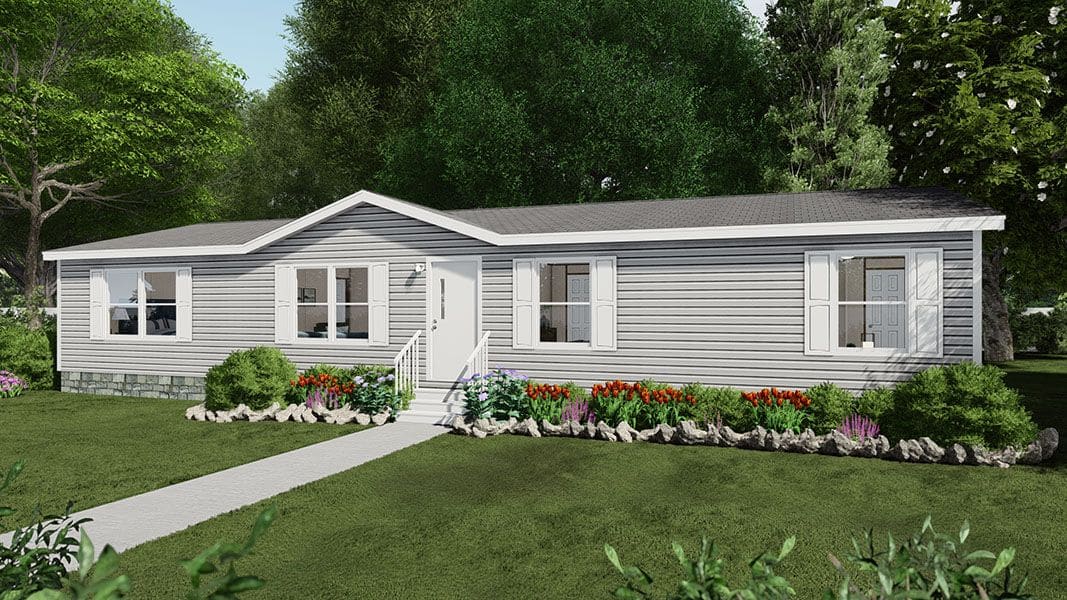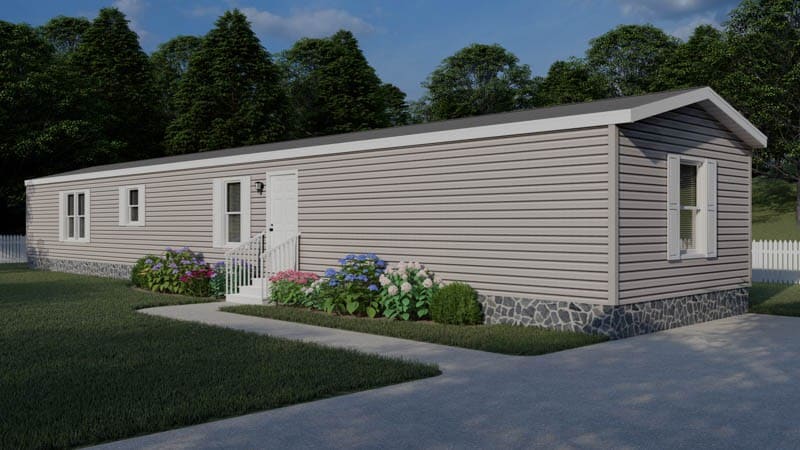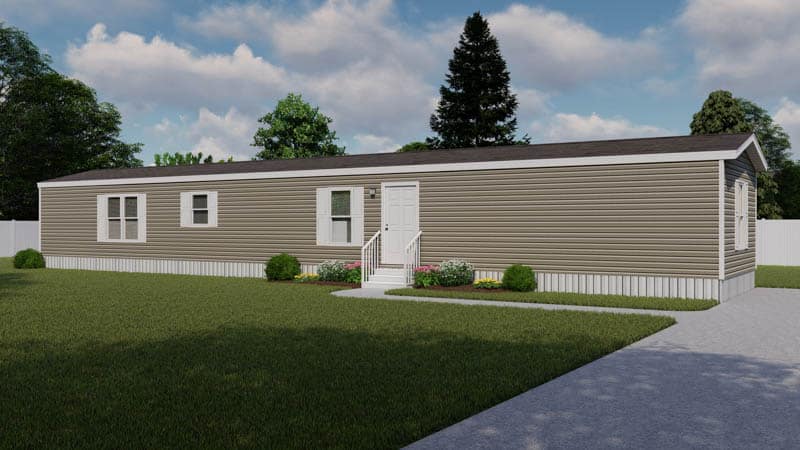
When you buy a manufactured home, you’ll likely come across manufactured home warranties. These buyer protections are almost always part of the process for newly built homes, and you may have warranty options for used homes, too. Whatever home you’re purchasing, it’s essential that you understand what these warranties are, what they cover in your home, and how to use them to your advantage.
Here, we’ll outline all these basics so you feel ready during the home buying process and whenever you need to use your warranty.
What Is a Manufactured Home Warranty?
Manufactured home warranties are designed to cover defects in materials and workmanship for a certain period of time, ensuring that your home meets certain quality standards even if a replacement or repair is needed. The period of time your home is covered will be defined in your warranty.
While you may be able to include additional coverage or add other warranties (more on that below), most warranties typically cover specific components of the home, like the structure, appliances, roofing, and plumbing, for a limited time after purchase. If something goes wrong with one of the items covered by your warranty, you usually submit a claim to report the issue and request repairs. Then, the manufacturer or dealer is responsible for fulfilling warranty claims according to the terms.
This is different from manufactured home insurance, which covers a broader range of risks and unexpected perils, like fire, theft, vandalism, natural disasters, and liability claims. For these, insurance usually covers the homeowner for an ongoing period or on a renewable basis.
Types of Manufactured Home Warranties
When purchasing a manufactured home, understanding the types of warranties available is crucial for ensuring your peace of mind and home protection. Here are some common types of warranties you might encounter:
- Manufacturer’s Warranty: This warranty, also known as a builder’s warranty, covers defects in materials and workmanship for a specific period after the home is purchased. Typically ranging from one to five years, this warranty ensures that the home meets quality standards set by the manufacturer of your home.
- Structural Warranty: A structural warranty guarantees the integrity of the home’s structure, including the roof, walls, floors, and foundation. It protects against defects that could compromise the safety or stability of the home, providing reassurance to homeowners regarding its long-term durability.
- Appliance Warranty: Many manufactured homes come equipped with appliances such as refrigerators, stoves, dishwashers, and HVAC systems. An appliance warranty covers these items for a certain period, ensuring that they are free from defects and will be repaired or replaced if necessary.
- Extended Warranty: While basic warranties cover essential components of the home for a limited time, extended warranties offer additional protection beyond the standard coverage. These warranties may be purchased separately or included as optional upgrades, providing extended peace of mind for homeowners.
- Installation Warranty: This warranty covers the installation of the manufactured home, ensuring that it is set up correctly and complies with local building codes. Installation warranties typically last for a limited time after the home is installed, providing protection against installation-related issues.
- Roof Warranty: A separate warranty may be provided for the roof of the manufactured home, covering defects in materials or workmanship and guaranteeing its performance for a certain period. This warranty ensures that the roof is free from leaks or structural issues, which can be common concerns for any homeowner.
- Waterproofing Warranty: Waterproofing warranties protect against water damage by covering the materials and techniques used to waterproof your home. This warranty ensures that the home is protected from moisture infiltration, which could lead to structural damage and other issues over time.
Understanding the types of warranties available for manufactured homes is essential for homeowners to make informed decisions and protect their investment. By knowing what each warranty covers and the duration of coverage, homeowners ensure that their home is adequately protected against defects and other potential issues.
Are Manufactured Home Warranties Included in Home Purchases?
One common concern among prospective buyers of manufactured homes is whether warranties are optional or mandatory and if they cost extra. The answer varies depending on several factors, including local regulations, manufacturer policies, and individual negotiations between the buyer and seller.
In short, basic warranties for manufactured homes are often included with the purchase of a new home, and extended warranties or additional coverage may be available as optional upgrades. For every purchase, buyers should carefully review their warranty options and consider their needs and budget.
Here are a few more details to know depending on the type of home you’re buying.
New Manufactured Home Warranties
In many cases, basic warranties are included with the purchase of a new manufactured home. These warranties, often provided by the manufacturer or dealer, typically cover defects in materials and workmanship for a specific period, such as one to five years. They may also include coverage for major components like the roof, plumbing, electrical systems, and appliances.
While these basic warranties are often included as part of the purchase agreement, buyers may have the option to purchase extended warranties or additional coverage for an extra cost. Extended warranties can provide added protection beyond the standard coverage, offering peace of mind to homeowners concerned about potential issues down the road.
Used Manufactured Home Warranties
Warranties for used manufactured homes may be less common than for new homes, but they are not unheard of. Some dealers or sellers of used manufactured homes may offer limited warranties to provide buyers with some level of protection against defects or problems that may arise shortly after purchase.
However, the availability and terms of warranties for used manufactured homes can vary widely, depending on factors such as the age and condition of the home, local regulations, and the policies of the seller. Buyers should inquire about warranty options and carefully review the terms of any warranty offered to understand what is covered as well as any limitations or exclusions that may apply.
Optional Coverage
In addition to the basic warranties included with the purchase of a manufactured home, buyers may have the option to purchase extended warranties or additional coverage for specific components or systems. These optional warranties may cover items such as appliances, structural components, roofing, or waterproofing materials, providing added protection against unexpected issues.
While optional warranties may come with an additional cost, they can offer valuable peace of mind to homeowners by providing comprehensive coverage for their manufactured home. Buyers should carefully consider their warranty options and weigh the cost against the level of protection offered to make an informed decision that meets their needs and budget.
Benefits of Manufactured Home Warranties
Overall, manufactured home warranties provide valuable protection and peace of mind for homeowners, ensuring that their homes remain safe, functional, and enjoyable for years to come. Here are a few essential benefits:
- Peace of Mind: Warranties help owners like you rest easy knowing that their home is protected against any defects in materials or workmanship.
- Financial Protection: Warranties can save homeowners money by covering the cost of repairs or replacements for covered components, potentially avoiding out-of-pocket expenses.
- Long-Term Investment: Warranties help protect your manufactured home investment by ensuring its structural integrity and functionality after installation.
- Convenience: Warranties often come with convenient claim processes, making it easier to address any issues that may arise with your home.
Tips for Using Your Manufactured Home Warranty
Understanding the terms and conditions of your manufactured home warranty is essential for ensuring that you can fully utilize its benefits and protections. Here are some tips to help you navigate your warranty effectively.
- Read and Understand the Warranty Document: Take the time to thoroughly read and understand the warranty document provided by your manufacturer or dealer. Pay attention to the coverage details, exclusions, limitations, and duration of coverage to ensure that you know what is and isn’t covered.
- Keep Documentation: Keep all documentation related to your warranty, including the warranty document itself, receipts for any repairs or maintenance, and records of communication with the manufacturer or dealer. Having this documentation on hand will make it easier to reference the terms of your warranty and provide evidence if you need to make a claim.
- Perform Regular Maintenance: To keep your home in good condition and prevent issues covered by the warranty, perform regular maintenance according to the manufacturer’s recommendations. This may include tasks such as inspecting the roof, checking for leaks, cleaning gutters, and servicing appliances.
- Know the Claim Process: Familiarize yourself with the process for making a warranty claim, including who to contact, what information is required, and any deadlines or timeframes for filing a claim. Follow the specified procedures carefully to ensure that your claim is processed smoothly and efficiently.
- Document Any Issues Promptly: If you encounter any issues covered by the warranty, document them promptly and notify the manufacturer or dealer as soon as possible. Provide detailed information about the problem, including when it occurred, how it has affected your home, and any steps you have taken to address it.
- Follow Warranty Procedures: Follow any procedures specified in the warranty for addressing issues or making claims, such as contacting authorized repair providers or obtaining approval from the manufacturer before proceeding with repairs. Failure to follow these procedures could result in your warranty claim being denied.
- Stay Informed: Stay informed about any updates or changes to your warranty coverage, such as expiration dates, renewal options, or changes in coverage terms. Keep in touch with the manufacturer or dealer for updates and information about your warranty.
By following these tips, you can ensure that you understand your manufactured home warranty and are able to effectively utilize its benefits to protect your home and address any issues that may arise.
Get Ready for Manufactured Home Ownership
Manufactured home warranties are essential for homeowners to protect their investment and ensure peace of mind. But that’s not all that goes into the purchase and ongoing maintenance of your manufactured home.
To be sure you’re ready for manufactured home ownership, check out our blog for expert education. We go over everything from understanding what a manufactured home is to choosing the right community for your lifestyle and more.






